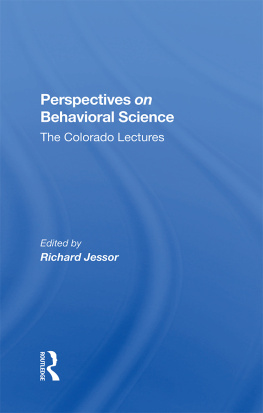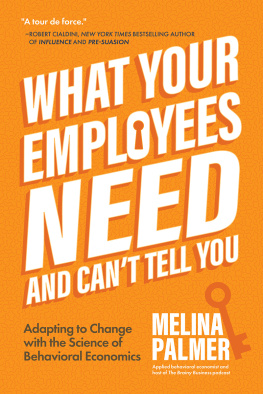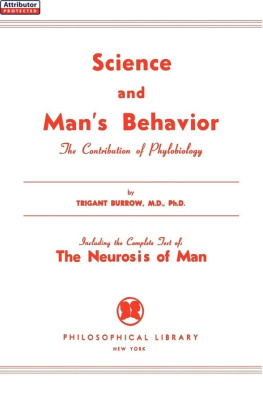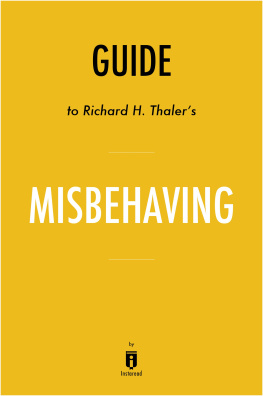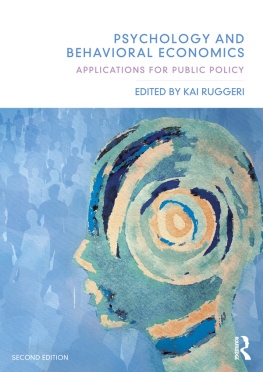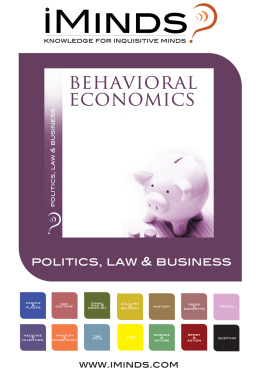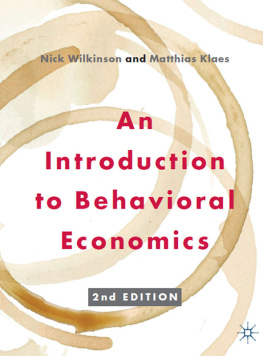Perspectives on Behavioral Science
Perspectives on Behavioral Science
The Colorado Lectures
edited by
Richard Jessor
First published 1991 by Westview Press, Inc.
Published 2019 by Routledge
52 Vanderbilt Avenue, New York, NY 10017
2 Park Square, Milton Park, Abingdon, Oxon OX14 4RN
Routledge is an imprint of the Taylor & Francis Group, an informa business
Copyright 1991 Taylor & Francis
All rights reserved. No part of this book may be reprinted or reproduced or utilised in any form or by any electronic, mechanical, or other means, now known or hereafter invented, including photocopying and recording, or in any information storage or retrieval system, without permission in writing from the publishers.
Notice:
Product or corporate names may be trademarks or registered trademarks, and are used only for identification and explanation without intent to infringe.
Library of Congress Cataloging-in-Publication Data
Perspectives on behavioral science: the Colorado lectures /edited by
Richard Jessor.
p. cm.
Includes index.
ISBN 0-8133-0844-5
1. Social sciencesMethodologyHistory20th century.
I. Jessor, Richard. II. Title: Colorado lectures.
H61.P528 1991
300dc20 90-21888
CIP
ISBN 13: 978-0-367-28271-4 (hbk)
Contents
, Richard Jessor
, Rom Harr
, Herbert A. Simon
, M. Brewster Smith
, Marvin Harris
, Neil J. Smelser
, J. David Singer
, Noam Chomsky
, David A. Hamburg
, Stanton Wheeler
, Samuel H. Preston
, Herbert C. Kelman
, Gilbert F. White
, Richard Jessor
Guide
This book celebrates an academic institution as well as an intellectual perspective. Since the substance of the book is about the latter, a few words should be said here about the former. From the time of its establishment at the University of Colorado in 1960, the Institute of Behavioral Science has been an important setting for the exploration of ideas and the pursuit of social inquiry. A large number of scholars have found that it offered them an ideal setting for interdisciplinary research and for exchange and interaction with scholars from disciplines other than their own. Over the years, many complex, multidisciplinary research endeavors have been initiated, carried out, and reported upon under the aegis of the institute. Over the years, also, many of the scholars involved in those projects have come to see their fields and their own work in a new light as a consequence of their interdisciplinary experience. Both its influence on research and its influence on scholarly lives need to be counted in measuring the institute's success.
Primary responsibility for whatever success the institute has had rests with the faculty who created the collegial and generative climate that has characterized this setting since its inception. Among the faculty, particular individuals played especially important roles at various times in the institute's history: Kenneth R. Hammond, who promoted its founding; the late Ozzie G. Simmons, who was its first full-time director; Gilbert F. White, whose leadership as director brought the institute to maturity; and Stuart W. Cook, whose steady hand steered it through difficulties on more than one occasion.
The support of the university administration has been consistent and generous from the institute's fledgling days until now. Deserving special mention in that regard are the late Milton E. Lipetz, former vice chancellor for Academic Affairs; Bruce R. Ekstrand, current vice chancellor for Academic Affairs; and Everly B. Fleischer, former dean of Arts and Sciences. It was Vice Chancellor Lipetz who provided the funds for the Distinguished Lecture Series that eventuated in this volume.
The organization of the lecture series was managed with superb care and unalloyed commitment by Debbie A. Ash. She was also responsible for the processing of the manuscript and for its preparation for publication. Without her involvement in every phase of this undertaking, it could not have succeeded. It would be difficult to exaggerate my appreciation for her contribution. I am grateful, too, to Illana Z. Gallon for the assistance she provided with various chapters of the manuscript.
Academic life has an urgency about it that often precludes the very reflection and unhurried rumination it is supposed to nurture. The celebration of the institute's twenty-fifth anniversary provided an opportunity to engage in just that kind of activity. This volume is the dividend of such scholarly thought.
Richard Jessor
Part One
Behavioral Science in Perspective
1
Perspectives on Behavioral Science
Richard Jessor
"Behavioral science" is a relatively new term, one that emerged only recently in the history of social inquiry. Invented after World War II, the term reflected important new developments in the various social and psychological disciplines as well as far-reaching aspirations for their integration and unification. It was in the context of those developments and aspirations, and in a postwar climate of pervasive intellectual ferment, that the Institute of Behavioral Science was established at the University of Colorado, Boulder. By the beginning of the 1960s, the institute had a full-time director, its own building (a remodeled church!), and a broad range of interdisciplinary research projects well underway. In celebration of the first quarter century of the institute's life history, a Distinguished Lecture Series in Behavioral Science was organized at the University of Colorado. Spanning two academic years, the series brought to campus a dozen outstanding scholarsall leaders in their fields, pioneers in the interstices among the traditional disciplines, and innovators working the terrain around the edges of the social sciences. This book is a collection of the lectures they presented.
In the thickets of everyday research, it is difficult to find a vantage from which the larger scientific enterprise might be seen whole. This series provided an opportunity for scholars to gain perspective on behavioral science near the end of the twentieth centurywhat it represents as an approach to knowledge about human nature in society, what forces were shaping its growth and development, and what its future might be. It seemed, in short, a propitious time for deliberate and self-conscious reflection, even stocktaking, about the state of behavioral science.
Unfortunately, there is no clear consensus on what the term "behavioral science" means or, perhaps, should mean. Sometimes it is used synonymously with the notion of social science; at other times, it is used to designate something different from, or in addition to, the social sciences; for example, the recent National Academy of Sciences report is titled "The Behavioral and Social Sciences" (Gerstein et al., 1988). Sometimes it is employed in the singularbehavioral scienceas in our own institute's name, but, probably more often, it is a collective termthe behavioral sciencesintended to aggregate a number of separate disciplines into a common fold. The plural usage in the purview of the Center for Advanced Study in the Behavioral Sciences exemplifies the latter.
Indeed, it was the establishment of that center by the Ford Foundation, and the concurrent initiation of its Behavioral Sciences Program in the early 1950s, that first gave prominence to the term "behavioral sciences" and assured not only its currency but also its endurance. Berelson (1968) traces those early developments and argues that the behavioral sciences constitute a special subset of the social sciences and can be distinguished from the latter largely by the particular disciplines and subdisciplines that it includes and excludes. He writes, "there seems to have been a genuine need for a collective term in addition to the traditional 'social sciences,' " and there is "a sense of both substantive and technical unity within this segment of the social sciences" (1968:43). Commenting on the very same events, Sutton adds, "the label 'behavioral sciences' was chosen because it could clearly embrace psychology and because it was thought to suggest a more firmly scientific approach than 'social sciences' " (1985:59).

